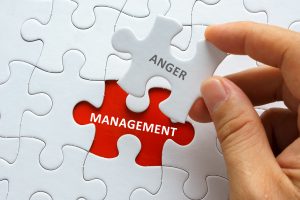By – James M. Katz, BA

Anger can be a powerful and sometimes destructive emotion if not managed effectively. Anger Management Consulting provides individuals with the strategies and tools necessary to understand, control, and express anger in a healthy way. By exploring the triggers, implementing immediate techniques for de-escalation, and adopting cognitive and creative approaches, individuals can learn to navigate their emotions more effectively. This article discusses key strategies that are essential in the journey toward mastering anger, whether for personal development or professional expertise, such as AIHCP’s Anger Management Consulting Certification.
Key Takeaways
- Recognizing early signs of anger and understanding personal triggers are foundational steps in anger management.
- Immediate techniques such as taking a moment to pause, deep breathing, and physical exercise can help de-escalate anger in the moment.
- Cognitive strategies, including disrupting negative thoughts and rational evaluation, empower individuals to respond to anger constructively.
- Creative outlets like art, writing, and role-play offer alternative methods for expressing and reflecting on anger.
- Professional help, such as AIHCP’s Anger Management Certification, can provide structured guidance and support for those seeking to improve their anger management skills.
Understanding the Triggers of Anger
Recognizing Early Warning Signs
Recognizing early warning signs of anger is crucial for timely intervention and prevention of negative outcomes. Detecting the emotion early can help prevent negative outcomes. Anger can trigger a ‘fight-or-flight’ response, leading to a surge of adrenaline and accompanying physical sensations:
- Rapid heartbeat
- Faster breathing
- Tense muscles
- Restlessness
- Clenched fists or jaw
- Sweating
- Trembling
Regular self-assessment is a key practice in identifying these triggers. By asking oneself about physical sensations, thoughts, and emotions on a daily basis, one can reveal early signs of stress and intervene before it escalates into anger.
In Anger Management Consulting, to effectively manage anger, it is essential to identify its triggers and warning signs. Being aware of the warning signs allows for proactive management of emotional responses and the prevention of full-blown anger outbursts.
Identifying Personal Anger Triggers
To effectively manage anger, it is crucial to identify personal triggers that can lead to outbursts. These triggers are often deeply rooted in individual experiences and can vary widely from person to person. They may include specific situations, interactions with certain individuals, or even particular times of day. Recognizing these triggers is a proactive step towards preventing the escalation of anger.
- Recognize situations that provoke anger
- Note interactions that consistently lead to frustration
- Be aware of times when vulnerability to anger is heightened
Once triggers are identified, it becomes possible to develop strategies to either avoid these situations or approach them with a different mindset. This self-awareness is a fundamental component of anger management and can significantly reduce the frequency and intensity of angry reactions.
By maintaining a reflective approach to daily interactions and emotional responses, individuals can pinpoint the specific elements that contribute to their anger. This insight is invaluable for crafting a personalized anger management plan.
The Role of Self-Awareness in Anger Management
Self-awareness is the foundation of emotional intelligence, and it plays a crucial role in managing anger. By increasing self-awareness, individuals gain insight into their emotional responses and can better understand the root causes of their anger. This understanding is pivotal in developing effective anger management strategies.
Self-care is an integral part of self-awareness and anger management. Engaging in activities that promote joy and relaxation can mitigate stress and prevent anger from escalating. This includes practices such as self-compassion, setting boundaries, and prioritizing self-reflection.
Developing healthy coping mechanisms is essential for long-term anger management.
By becoming more attuned to one’s emotions during everyday tasks, individuals can identify anger and its triggers more swiftly. This heightened awareness allows for the application of coping strategies to manage anger proactively. Such strategies may include:
- Breathing exercises and imagery
- Emotional control techniques
- Delaying anger responses to utilize learned coping mechanisms
Ultimately, self-awareness empowers individuals to improve their physical and emotional health, rebuild and form healthy relationships, and express anger in a constructive manner.
Immediate Techniques for Anger De-escalation
Strategies to Buy Time Before Reacting
In the face of rising anger, it is imperative to buy time before reacting. This pause can be the difference between a constructive response and a regrettable one. Here are some effective methods:
- Counting to 10 before you respond
- Taking a short walk to clear your mind
- Repeating a calming word or phrase
- Discussing your feelings with a trusted individual
These strategies serve as a buffer, allowing you to step back and assess the situation with a clearer perspective.
It is crucial to recognize that managing anger is a skill that requires patience and consistent practice. The goal is to integrate these techniques into your daily routine so they become second nature when you need them the most.
Remember, the objective is not to suppress anger but to understand and channel it constructively. By implementing these strategies, you can gain more emotional control and navigate tense situations more effectively.
Breathing and Relaxation Exercises
In the heat of anger, it is crucial to have immediate techniques to prevent escalation. Deep breathing is a fundamental practice that can have a profound calming effect. By focusing on taking slow, deep breaths, you can lower your heart rate and relax your muscles, creating a sense of tranquility that counteracts the intensity of anger.
- Begin by finding a quiet space.
- Close your eyes and take a slow, deep breath through your nose, allowing your belly to rise.
- Exhale slowly through your mouth, feeling your belly deflate.
- Repeat this process, concentrating on the rhythm of your breathing.
Progressive muscle relaxation is another technique that complements deep breathing. It involves tensing and then relaxing different muscle groups in sequence, which can help to release physical tension that often accompanies anger.
By integrating mindfulness into your Anger Management relaxation routine, you can enhance your self-awareness and manage stress-related thoughts more effectively. This approach encourages you to observe your thoughts and feelings without judgment, anchoring you in the present moment.
Yoga and meditation are additional practices that support breathing and relaxation exercises. They not only improve body awareness and concentration but also fit seamlessly into various lifestyles, allowing for flexibility in managing anger.
The Power of Physical Exercise in Reducing Anger
Engaging in physical activity is a potent strategy for managing anger. Regular exercise serves as a healthy outlet, allowing for the release of pent-up energy and the production of mood-enhancing endorphins. This natural physiological response can lead to a calmer state of mind, akin to the body’s recovery after a workout.
- Engage in a quick burst of exercise: Activities like running, lifting weights, or taking a brisk walk can help channel the energy generated by anger into a more productive pursuit.
- Release tension through movement: Simple actions such as tapping fingers or engaging in physical movements can alleviate anger, redirecting it towards healthier activities.
By incorporating physical exercise into your routine, you can improve your mood, reduce stress, and enhance your tolerance for frustration, ultimately leading to better anger management.
Cognitive Approaches to Managing Anger
Disrupting Negative Thought Patterns
Negative thought patterns, such as overgeneralizing, blaming, and obsessing over ‘musts’ and ‘shoulds’, can significantly contribute to anger. These patterns often lead to rumination on distressing situations, escalating frustration and increasing the likelihood of an outburst. To combat this, it is essential to identify and actively disrupt these patterns.
- Recognize when you are engaging in negative thinking.
- Challenge the validity of these thoughts.
- Replace them with more balanced and rational perspectives.
When you find yourself stuck in a loop of angry thoughts, seek a distraction that can help shift your focus. Engaging in activities like reading, watching a movie, or exercising can provide a mental break and allow you to approach the situation with a clearer mind.
Understanding the triggers of your anger through reflection after calming activities can lead to more effective management strategies. By committing to these practices, you can gradually reduce the power of negative thought patterns over your emotional state.
Rational Evaluation of Anger Responses
The process of rational evaluation involves a deliberate and thoughtful analysis of one’s anger responses. It is a critical step in managing emotions effectively and preventing the escalation of conflicts. By examining the reasons behind our anger, we can determine whether our feelings are justified and how best to address the situation.
- Recognize your anger and name your feelings.
- Reflect on the causes of your anger, whether it’s frustration or stress.
- Respond rationally, using strategies to control anger and communicate calmly.
Rational evaluation allows for a constructive approach to dealing with anger, focusing on problem-solving rather than impulsive reactions. It is an action-oriented process that encourages individuals to manage their emotions, thoughts, and behaviors in a healthy manner.
Developing healthy coping mechanisms is essential for long-term anger management. It is important to cultivate gratitude and respond to situations constructively. By doing so, we can create a more harmonious environment, both at home and in the workplace.
Adopting a Problem-Solving Mindset

Adopting a problem-solving mindset is a transformative approach to managing anger. By focusing on solutions rather than dwelling on the causes of anger, individuals can channel their emotional energy into positive action. This shift in perspective encourages a proactive stance towards conflict and frustration.
- Identify the issue causing anger.
- Brainstorm potential solutions.
- Evaluate the options and choose the most constructive path.
- Implement the chosen solution and monitor its effectiveness.
Embracing a problem-solving mindset not only diffuses the immediate emotional response but also builds resilience and adaptability for future challenges. It is a skill that, once honed, can significantly improve interpersonal relationships and personal well-being.
Remember, the goal is not to suppress anger but to understand it as a signal that something needs attention. By addressing the underlying issues with a clear and calm approach, anger can become a catalyst for growth and positive change.
Creative Outlets for Anger Expression
Artistic Activities as Emotional Release
Artistic activities offer a powerful means for expressing and managing anger. Engaging in creative pursuits such as painting or drawing can serve as a vibrant and expressive hobby, allowing individuals to channel their emotions into something tangible and constructive. This form of emotional release can be particularly effective as it provides a non-verbal way to communicate feelings that might be difficult to articulate.
- Sing out your anger
- Dance to your favorite song in private
- Draw or paint your emotions
- Use humor to lighten the mood
These activities not only help in releasing pent-up energy but also in reducing the intensity of anger. Once the initial wave of emotion has subsided, it becomes easier to approach the situation or person that caused the anger with a calmer perspective. Creative expression thus acts as a bridge to more constructive communication and problem-solving.
Engaging in artistic activities can be a solitary or shared experience, but either way, it allows for a personal exploration of emotions and the development of a healthier response to anger.
Writing and Journaling for Reflection
The act of writing and journaling serves as a powerful tool for reflection and emotional processing. When overwhelmed by anger, it can be difficult to articulate thoughts and feelings. Journaling provides a private space to explore these emotions, offering a form of self-therapy that can lead to clarity and calm.
- Begin by acknowledging your feelings without judgment.
- Write freely about the situation that triggered your anger.
- Reflect on the physical and emotional responses you experienced.
Through this process, patterns may emerge that highlight recurring triggers or ineffective coping strategies. By identifying these patterns, individuals can work towards developing healthier responses to anger.
Journaling not only captures the immediate sentiments but also serves as a historical record. Over time, reviewing past entries can reveal personal growth and the effectiveness of anger management techniques. It is a step towards mastering self-awareness and ultimately, self-regulation.
Engaging in Role-Play Scenarios
Role-play scenarios are a dynamic and interactive way to practice anger management. By simulating real-life situations, individuals can explore and rehearse different strategies for handling their emotions. Engaging in role-play allows for a safe space to experiment with various responses to anger triggers, leading to better outcomes in actual scenarios.
- Encourage exploration of different strategies
- Discuss outcomes and alternative approaches
- Reinforce learning through repetition
Role-play can be particularly effective when it involves a supportive partner or group who can provide feedback and alternative perspectives. This collaborative approach can help in identifying the most effective techniques for managing anger.

By regularly incorporating role-play into anger management practice, individuals can gain confidence in their ability to handle challenging situations with composure and assertiveness.
Professional Anger Management Therapy
When to Seek Professional Help
Recognizing when to seek professional help is a critical step in managing anger effectively. It is essential to understand that reaching out for professional assistance is a sign of self-awareness and a proactive approach to mental health. When stress becomes too much to bear, anxiety turns debilitating, or anger starts to dominate one’s daily life, these are clear indicators that it may be time to consult a mental health professional.
Therapy can provide a structured environment for individuals to explore their feelings, develop coping strategies, and work through stressors in a supportive and confidential setting.
To begin the process of seeking a certified Anger Management Specialist, consider the following steps:
- Identify the need for help: Acknowledge feelings of overwhelm and the inability to cope as indicators that professional guidance may be beneficial.
- Research options: Explore various therapy modalities and mental health professionals to find the right fit for your needs.
- Make the commitment: Prioritize mental health by scheduling and attending therapy sessions regularly.
Benefits of Anger Management Counseling
Anger management counseling offers a multitude of advantages for individuals struggling to regulate their emotional responses. Engaging in anger management courses under the guidance of a trained psychologist can lead to a transformative journey towards constructive stress response and emotional well-being.
- The acquisition of anger management skills through counseling can positively influence various aspects of life, including personal relationships and professional interactions.
- Participants often report a sense of relief and improved mental health following each counseling session.
- The structured environment of counseling provides a safe space to explore underlying causes of anger and to practice new techniques for managing intense emotions.
The benefits of anger management counseling are not limited to moments of distress but extend to fostering a more harmonious daily existence.
By learning to control anger and its associated behaviors, individuals can prevent the negative consequences that unchecked anger can bring to their lives and the lives of those around them.
Exploring AIHCP’s Anger Management Consulting Certification
The pursuit of Anger Management Certification is a commendable step for professionals who aim to specialize in this critical area of mental health. AIHCP’s Anger Management Consulting Certification offers a comprehensive program that aligns with both academic and professional goals. The certification is designed as an online, independent study, providing flexibility for those with busy schedules.
- The program is tailored for qualified professionals.
- It several online anger management courses, culminating in a robust certification.
- The curriculum is accessible and can be integrated with existing commitments.
The Anger Management certification equips individuals with the necessary skills to effectively manage and consult on anger-related issues, fostering better stress management and coping strategies.
Professionals who complete this certification will be well-prepared to address a range of anger management challenges, ensuring they can provide high-quality support and interventions. This certification is not only a testament to one’s dedication but also a powerful tool in enhancing one’s ability to make a positive impact in the field of anger management.
Parental Influence on Children’s Anger Management
Modeling Healthy Anger Management for Children
Children are astute observers and often emulate the behaviors they witness in their parents and caregivers. It is crucial for adults to exhibit healthy anger management techniques as children will likely adopt similar strategies in their own emotional regulation.
- Demonstrate calm and controlled responses to frustrating situations, providing a clear example for children to follow.
- Engage in open discussions about emotions, emphasizing that it is normal to feel angry, but it is important to express it in a constructive manner.
- Practice what you preach by consistently applying the anger management techniques you wish your children to learn.
By consistently modeling positive behavior and providing a stable emotional environment, parents and caregivers can significantly influence a child’s ability to manage anger effectively.
Encouraging children to participate in role-play scenarios can also be beneficial. This allows them to practice responding to anger triggers in a safe and controlled setting. Reinforcing positive behavior through praise and recognition further motivates children to continue developing their anger management skills. Ultimately, by equipping children with the tools and understanding necessary to navigate their emotions, adults lay the foundation for healthier emotional development.
Teaching Techniques to Young Children
Instilling effective anger management techniques in young children is essential for their emotional development and social integration. Parents and caregivers play a pivotal role in guiding children through the process of understanding and expressing their emotions in a healthy manner.
- Encourage the use of deep breathing exercises to promote calmness.
- Introduce mindfulness activities that can help children become more aware of their feelings.
- Utilize tools like a calming jar to provide a visual aid for self-regulation.
Patience and consistent reinforcement are key as children learn to manage their emotions. Offer praise and positive attention to reinforce good behavior and acknowledge their efforts in handling anger constructively.
Remember, these skills are foundational and require time and practice to develop. By fostering a nurturing environment and providing the right tools and support, we can empower children to navigate their emotions and lay the groundwork for a well-adjusted future.
Supporting Teens in Developing Anger Management Skills
Anger management is a pivotal aspect of adolescent development. Parents are instrumental in guiding their teens through the complexities of emotional regulation. To foster these skills, it is beneficial to:
- Encourage the recognition of early warning signs of anger.
- Teach positive conflict resolution strategies.
- Introduce simple relaxation techniques to control emotional responses.
By consistently practicing these techniques, teens can develop coping skills that will serve them well into adulthood.
It is also important to create a supportive home environment where teens feel safe to express their emotions and discuss their challenges. Resources such as books, online materials, and mobile applications can offer additional support. When necessary, seeking professional help can provide a structured approach to managing anger effectively.
Building a Supportive Environment for Anger Management
Creating a Harmonious Home Atmosphere
The foundation of a harmonious home atmosphere lies in the ability of its members to manage emotions effectively, particularly anger. A calm and supportive environment is not only beneficial for individual well-being but also crucial for the collective harmony of the household.
- Establish clear communication channels to express feelings without fear of judgment.
- Implement routines that encourage relaxation and stress reduction.
- Foster an atmosphere of understanding and patience among family members.
A harmonious home is a place where each person feels heard, valued, and supported, contributing to a collective sense of peace and stability.
Creating such an environment requires consistent effort and the application of various anger management techniques. It is a proactive step that signifies strength and commitment to the well-being of the family. By prioritizing the cultivation of a calm home, individuals can significantly reduce the occurrence and impact of anger within their personal lives.
The Importance of Community Support
The fabric of our mental health is often woven tightly with the threads of our community and relationships. Strong community support is crucial in fostering mental well-being by providing a sense of belonging and social connection. These bonds can act as a buffer against the pressures that lead to mental exhaustion and are particularly valuable in the context of anger management.
The presence of a robust support network can be a bulwark against the isolating effects of mental exhaustion. It offers a space for emotional expression and practical assistance, which can be invaluable during recovery.
In the journey of anger management, the role of community cannot be overstated. A supportive environment encourages open dialogue, reduces stigma, and normalizes seeking help. Here are some steps to leverage community support:
- Reach out to loved ones for emotional support and practical help.
- Cultivate mindfulness and personal growth outside of work.
- Seek support when needed, recognizing it as a sign of strength.
Remember, integrating these habits into daily routines creates a sustainable foundation for mental resilience and improves overall quality of life. Community support also offers valuable insights and strategies for managing anger, emphasizing that seeking support is not a sign of weakness but a proactive step toward well-being.
Leveraging Educational Resources and Programs
Educational resources and programs play a pivotal role in the landscape of anger management. Accessible and tailored educational materials can significantly enhance the effectiveness of anger management strategies. These resources often include:
- Online courses and workshops
- Interactive tools and apps
- Comprehensive literature and guides
By integrating these tools into daily routines, individuals can steadily build their knowledge and skills in managing anger. It is crucial to select resources that resonate with personal learning styles and life circumstances to ensure consistent engagement and application.
The utilization of educational resources should be a proactive and ongoing effort, contributing to the development of a robust anger management skill set.
Furthermore, the collaboration between mental health professionals and educational platforms can extend the benefits of these resources, making them more widely available and adaptable to various needs. This synergy is essential for creating a supportive environment conducive to learning and personal growth.
Long-Term Strategies for Anger Control
Developing a Personal Anger Management Plan
Becoming an Anger Manager involves a commitment to personal growth and the development of strategies tailored to individual needs. Creating a personal anger management plan is a proactive step towards understanding and controlling one’s own anger responses. This plan should be comprehensive, addressing immediate reactions as well as long-term strategies for anger control.
- Begin by recognizing the signs of anger and identifying your personal triggers.
- Incorporate techniques such as relaxation exercises and cognitive restructuring to manage anger in the moment.
- Establish healthy coping mechanisms that can be used in various situations, ensuring they are practical and easily accessible.
Developing a personal plan is not about suppressing emotions but about finding effective ways to express and manage them. It is a dynamic process that requires regular review and adjustment to remain effective over time.
Remember, the goal is to learn and practice effective anger management techniques that lead to a healthier emotional life. Whether it’s through changing your environment, engaging in physical exercise, or seeking professional help, each step you take is crucial in the journey of becoming an Anger Manager.
Commitment to Continuous Practice
The journey of mastering anger management is an ongoing process that requires a commitment to continuous practice. Like any skill, proficiency in managing anger improves with regular application and refinement of techniques learned through counseling or self-help strategies.
- Regular check-ins with oneself to assess progress
- Incorporating self-care practices into daily routines
- Engaging in physical activity to channel angry energy constructively
Consistency in applying anger management techniques is crucial for long-term success and mental well-being.
It is important to remember that setbacks are a natural part of the learning curve. Rather than viewing them as failures, they should be seen as opportunities for growth and further development. By maintaining a proactive approach and adapting strategies as needed, individuals can ensure that their anger management skills remain effective and relevant over time.
Monitoring Progress and Adjusting Techniques
The journey of mastering anger management is an ongoing process that requires consistent monitoring and adaptation. As individuals progress, it’s crucial to periodically assess the effectiveness of the strategies being employed. This can be done by:
- Keeping a detailed journal of anger episodes and the circumstances that triggered them.
- Reflecting on the coping strategies used during these episodes and their outcomes.
- Seeking feedback from trusted individuals about changes in behavior.
Adjustments to techniques should be made based on these reflections and feedback. It’s important to recognize that what works for one person may not work for another, and strategies may need to evolve over time.
Embracing the concept of the ‘3 R’s of Anger’—Recognize, Respond, and Reflect—can guide individuals in this process. Utilizing anger management techniques and coping strategies is another important aspect of the response phase. This can include deep breathing exercises, which are a direct way to calm the physiological response to anger.
Ultimately, the goal is to develop a set of personalized strategies that are effective and sustainable for long-term anger control. This requires a commitment to self-improvement and the willingness to make necessary changes as one grows and learns.
Anger Management for Specific Populations
Tailoring Strategies for Teens and Adolescents
Adolescence is a period marked by significant emotional and physiological changes, which can often amplify feelings of anger. Developing tailored anger management strategies for teens and adolescents is crucial to help them navigate this challenging phase of life.
- Deep breathing exercises can be a starting point, helping to calm the body’s physiological response to anger.
- Encouraging teens to count to ten before reacting can provide a simple yet effective pause that allows for more thoughtful responses.
- Establishing open communication channels between parents and teens can foster understanding and provide a safe space for expressing emotions.
It is essential to explore various resources and tools to find the ones that best suit your teen’s needs. Books, online resources, mobile applications, and community support can all play a role in equipping teens with the necessary skills to manage their anger effectively.
By addressing the unique challenges that arise during the teenage years, including hormonal changes and social pressures, parents and caregivers can better support their adolescents in developing healthy anger management techniques.
Addressing Anger Issues in the Workplace
In the professional environment, anger can have far-reaching consequences, affecting not only the individual but also team dynamics and overall productivity. Effective management of anger in the workplace is therefore crucial for maintaining a healthy and constructive work atmosphere.
- Recognize the impact of anger on colleagues and the work environment.
- Develop clear policies and communication channels for addressing grievances.
- Encourage a culture of openness where employees feel safe to express concerns.
It is essential for organizations to foster an environment where anger is acknowledged as a natural emotion, but where its expression is channeled through appropriate and professional means.
Training programs and workshops can be instrumental in equipping employees with the skills to handle their emotions. Regular sessions on emotional intelligence and conflict resolution can help in preemptively managing potential anger issues, ensuring a more harmonious workplace.
Cultural Considerations in Anger Management
Anger management strategies are not one-size-fits-all; they must be adapted to respect and incorporate cultural nuances. Cultural differences in anger expression, such as those dictated by display rules, significantly influence how individuals manage and convey their anger. It is essential to understand these cultural distinctions to provide effective anger management support.
- Recognize the importance of cultural context in anger expression
- Adapt anger management techniques to align with cultural norms
- Educate on the diversity of anger management across cultures
Developing a nuanced understanding of cultural variations in anger management can lead to more empathetic and effective consulting practices.
Professionals in the field of anger management must be equipped with the knowledge to tailor their approaches to the individual’s cultural background. This sensitivity not only enhances the therapeutic relationship but also ensures that the strategies provided are relevant and applicable.
Conclusion: The Journey to Mastering Anger
The Impact of Effective Anger Management
The journey towards mastering one’s temper is marked by the profound impact that effective anger management can have on an individual’s life. Managing anger effectively can significantly improve your relationships with family, friends, and colleagues, fostering a more harmonious existence.
Effective anger management leads to the development of healthier ways of expressing anger, which in turn enhances interpersonal interactions and self-perception.
By learning and practicing effective anger management techniques, individuals can experience a multitude of benefits, including:
- Increased emotional intelligence and self-control
- Better stress management and reduced anxiety
- Enhanced communication skills and conflict resolution abilities
These improvements are not limited to personal life but also extend to professional environments, where controlled responses to stress and provocation are highly valued. The ripple effect of these changes can lead to a more peaceful and productive community, as individuals who manage their anger well can influence others around them.
Creating Lasting Change in Personal and Professional Life
Mastering anger management is a transformative journey that extends beyond temporary fixes to foster sustainable health and well-being. It is about integrating strategies into daily life that promote resilience and adaptability, enabling individuals to face challenges with confidence and composure.
- Promote overall well-being by building an identity outside of work.
- Seek social support to reduce feelings of isolation.
- Practice time management to prioritize important tasks.
In the professional realm, these skills are invaluable for conflict resolution, enhancing communication, and building trust within teams. Similarly, in personal life, effective anger management leads to stronger and more fulfilling relationships, where open and honest expression is the foundation.
The key to creating lasting change is consistency. It involves a commitment to practice and refine anger management techniques over time, ensuring they become second nature.
By embracing self-care as an act of kindness and self-respect, individuals can make profound statements of self-love that resonate in every aspect of their lives.
Reviewing AIHCP’s Anger Management Consulting Program

The AIHCP’s Anger Management Consulting Certification is a comprehensive program designed for professionals who aspire to specialize in this critical area of mental health. It offers a flexible, online, and independent study format that caters to the needs of busy individuals seeking to enhance their qualifications with a four-year certification.
- The program is tailored to fit academic and professional goals.
- It is accessible to qualified professionals from various backgrounds.
- The certification provides a robust foundation for effectively managing anger in diverse settings.
The journey to mastering anger management is a continuous process, and the AIHCP’s certification program equips participants with the tools and knowledge necessary for long-term success.
Upon completion, graduates are well-prepared to implement effective anger management strategies, contributing to their personal growth and the well-being of those they serve. The program not only enriches one’s professional skill set but also fosters a deeper understanding of anger dynamics, ultimately enhancing the quality of care provided to clients.
Embarking on the journey to mastering anger is a transformative process that can lead to profound personal growth and improved relationships. As you reach the conclusion of this path, remember that continued learning and practice are key to maintaining the progress you’ve made. To further support your journey, we invite you to visit our website for additional resources, courses, and expert guidance. Take the next step in your anger management mastery by exploring our Anger Management Specialist Course Program and join a community committed to excellence in emotional regulation and interpersonal communication.
CONCLUSION
In conclusion, mastering anger management is essential for fostering a peaceful and harmonious environment, whether at home, in the workplace, or in personal relationships. The strategies discussed, from recognizing the signs of anger to seeking professional help, are crucial steps in learning to control this powerful emotion. Parents, in particular, have a significant role in modeling healthy anger management to their children and teens, setting the foundation for their emotional development. We encourage individuals to consider the AIHCP’s Anger Management Consulting Certification as a resource to further their understanding and skills in this area. Remember, managing anger effectively is not just about avoiding conflict; it’s about building a life where respect, empathy, and understanding lead the way.
Frequently Asked Questions
What are some effective strategies for managing anger?
Effective strategies include recognizing early warning signs, buying time before reacting, practicing breathing and relaxation exercises, engaging in physical exercise, disrupting negative thought patterns, rational evaluation of anger responses, finding creative outlets, and seeking professional help.
How can I recognize the early warning signs of anger?
Early warning signs include physical symptoms like increased heart rate, tension, or clenching, as well as emotional signs such as irritation, frustration, or feeling overwhelmed.
What role does self-awareness play in anger management?
Self-awareness helps individuals understand their personal triggers and responses to anger, enabling them to anticipate and manage their reactions more effectively.
Can physical exercise really help reduce anger?
Yes, physical exercise can be a powerful tool for reducing anger as it helps release tension and stress, and it can improve mood through the release of endorphins.
What are some cognitive approaches to managing anger?
Cognitive approaches include disrupting negative thought patterns, rational evaluation of anger responses, and adopting a problem-solving mindset to address underlying issues.
When should someone seek professional help for anger management?
Professional help should be sought when anger becomes frequent, intense, leads to aggression or violence, or negatively impacts relationships and daily functioning.
How can parents influence their children’s anger management?
Parents can model healthy anger management strategies, teach techniques to their children, and support their development of anger management skills through guidance and example.
What is AIHCP’s Anger Management Consulting Certification?
AIHCP’s Anger Management Consulting Certification is a program designed to equip individuals with the knowledge and skills necessary to help others effectively manage their anger and create harmonious environments.
Research Articles:
Effects of a nonviolent communication-based anger management program on psychiatric inpatients. Jiyeon Kim, Sungjae Kim, Archives of Psychiatric Nursing, Volume 41, 2022, Pages 87-95, ISSN 0883-9417, https://doi.org/10.1016/j.apnu.2022.07.004.
Access link here https://www.sciencedirect.com/science/article/abs/pii/S0883941722000772
Self-Help Techniques in Anger Management with Cognitive Behavioral Interventions: Understanding and Managing Anger. BULUT, M., & YÜKSEL, Ç. (2023). Humanistic Perspective, 5(2), 844-856. https://doi.org/10.47793/hp.1222353
Access link here https://dergipark.org.tr/en/pub/hp/article/1222353
Parent–Child Recurring Conflict: A Mediator between Parental Anger Management and Adolescent Behavior. Erin Donohue, Et Al Family and Consumer Sciences Vol 51, Issue 1 First published: 03 August 2022 https://doi.org/10.1111/fcsr.12450
Access link here https://onlinelibrary.wiley.com/doi/abs/10.1111/fcsr.12450
Changes in The Signs, Symptoms, and Anger Management of Patients with A Risk of Violent Behavior After Receiving Assertive Training and Family Psychoeducation Using Roy’s Theoretical Approach: A Case Report. Fahrizal, Y., Et Al. (2020). Jurnal Keperawatan Indonesia, 23(1), 1–14. https://doi.org/10.7454/jki.v23i1.598
Access link here https://jki.ui.ac.id/index.php/jki/article/view/902











